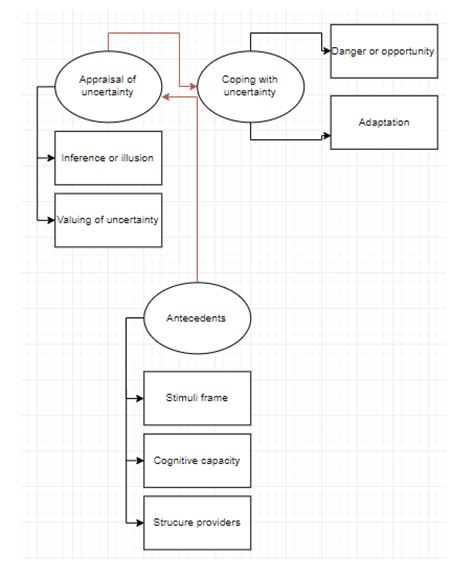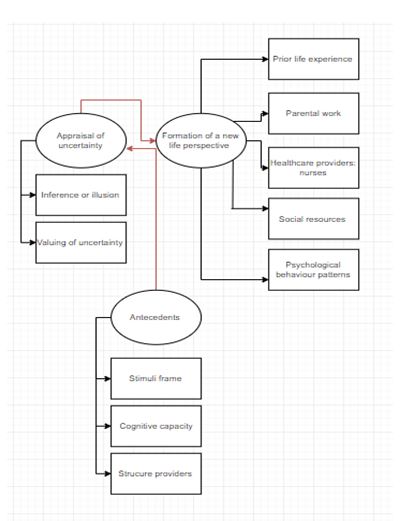Theoretical Framework
The theory which will be used as a basis for theoretical framework for the current project is Mishele’s theory of uncertainty in illnesses. The approach inquiries establish the hypothesis that uncertainty is related to people’s inability to predict particular actions’ outcomes (Moreland & Santacroce, 2019). The model can efficiently show the uncertainty problems related to diagnosing and preventing illnesses in healthcare. In other words, the theory addresses the problem of the subjective perception of the treatment outcomes and diseases under the prism of uncertainty. Mishele’s idea applied within the nursing scope helps to analyze the cognitive frames of the patients which cause the illness-related uncertainty. Such knowledge may be helpful in predicting particular health-care-related dangers, providing the possibility to control the uncertainty level in patients.
The conceptualized approach represents the structure of Mishele’s theory of uncertainty in illnesses. The model allocates four primary concepts which are deeply interrelated: human beings, environment, health, and nursing (Moreland & Santacroce, 2019). The relationships between the mentioned concepts may be described as the corresponding connection. Each defined notion affects the other to a particular extent. The uncertainty related to illnesses may occur exceptionally as a result of the combination of the mentioned concepts. For example, healthcare problems usually result from the environmental impact of human beings. At the same time, nursing is the sphere that connects medicine and patients. Nurses serve as mediators between clinicians and patients, increasing people’s awareness of their health conditions. Efficient nurses’ work can decrease the level of illness-related uncertainty.
Researchers widely use Mishele’s theory of uncertainty in illnesses to explore the impact of posttraumatic stress disease in different groups of patients. For example, Moreland & Santacroce (2019) explore the question of how posttraumatic stress syndrome affects young adults with congenital heart disease. In the scope of the research, scientists apply the framework evolving Mishele’s theory of uncertainty in illnesses as an essential element. The researchers prove the primary hypothesis that chronic uncertainty increases the risk of the development of posttraumatic stress disorder (Moreland & Santacroce, 2019). Thus, the psychological impact of the illness-related uncertainty significantly affects the general health condition of the patients. In order to increase the quality of patient-oriented health care, clinicians should implement strategies for minimizing the risks of the development of medical traumatic stress disorder caused by uncertainty.
The other group of researchers explores the correlation between uncertainty and mental health. Analyzing the previous work related to this theme, Al-Mitwalli et al. (2021) implemented Mishele’s theory of uncertainty of illnesses as an essential inquiry of the study. Mishele’s model was primarily used for measuring the uncertainty evolving the varied scales such as MUIS (Al-Mitwalli et al., 2021). The direct correlation between traumatic stress was identified thanks to such an approach. Most of the studies reported the negative impact of uncertainty on the mental health of patients of all ages.
The uncertainty consequences are also considered to impact the quality of life negatively. Such problems are primarily related to posttraumatic stress disorder in patients. The researchers analyze the uncertainty concepts based on Mishele’s theory of uncertainty of illnesses (Bryant et al., 2022). The major problem identified by the scholars is the low level of nursing support and lack of care (Bryant et al., 2022). The connection between the mentioned concepts of the theory can help moderate the negative consequence of uncertainty prevention. Minimizing the effects of posttraumatic stress disorder can increase the quality of life.
Application of the Theoretical Framework
As stated earlier, posttraumatic stress disorder directly correlates with illness-related uncertainty. The mentioned problem is extremely dangerous for children. Pediatric medical traumatic stress (PMTS) is a widely-spread notion among children, significantly affecting their life quality. Posttraumatic stress affects children significantly during their vital stages of physiological, psychological, and psychosocial development. As a result, the young population is at a higher risk of occurrence of various psychological problems. Nursing strives to find the measures to prevent the development of such potentially dangerous consequences. In order to design the model to cope with PMTS, Mishele’s theory of uncertainty in illnesses can be used as a starting point. Current work will use the adapted model of the original theory reconceptualized for coping with uncertainty in relation to PMTS.
Constant emotional overstrain and insomnia lead to weakness or asthenic syndrome which is characterized as a complex of symptoms of manifestation of nervous activity. The children quickly get tired, do not improve with developing activity, try to perceive physical activity, and concentrate poorly. Psychological trauma affects the process of physical and mental development. In the absence of timely diagnosis and adequate treatment, posttraumatic stress disorder in children becomes chronic, complicated by the development of secondary depression, the appearance of obsessive-compulsive disorder, and phobias. Thus, it is hazardous for children to experience traumatic events related to illnesses. The unique method of coping with the consequences of PMTS can be framed based on Mishele’s theory of uncertainty in diseases.
The discussed nursing theory will be applied based on the idea that uncertainty is the leading reason for posttraumatic stress disorder occurrence. The original model provides only theoretical information related to uncertainty coping. Thus, the reconceptualization will be focused on this direction. Dealing with the uncertainty notion proposed by Mishele cannot be helpful in cases of PMTS. Independent children’s coping can result in the formation of harmful psychological and mental consequences. In order to eliminate or at least minimize the effects of the PMTS, the construction of a new life perspective should be evolved. It allocates the healthcare, social, and parental resources to ensure that children can overcome the problem of uncertainty. Moreover, by providing psychological and behavioral models to increase awareness of illnesses, the parents and nurses can help children eliminate the problem of uncertainty.
Based on the data mentioned above, the adapted framework will be used in the project to estimate the cases of overcoming uncertainty related to PMTS. The theoretical resources and practical issues of posttraumatic stress in the childhood population will be evaluated through the perspective of the adapted model. In other words, the methods of overcoming the PMTS offered in the works will be analyzed based on the adapted model of Mishele’s theory of uncertainty in illnesses.
Visual Representation of the Original and Adapted Models
Figure 1 depicts the original model of Mishele’s theory of uncertainty in illnesses. It includes three significant aspects antecedents, appraisal of uncertainty, and coping with uncertainty. The first aspect can be associated with symptoms, possibilities of the patients to comprehend their illness, and the structure providers such as education, social status, and others. The second aspect defines the inquiries of uncertainty, including illusion and danger. As it is seen in Figure 1, the original model addresses the element of dealing with uncertainty. It is divided into the adaptation of the people to the environmental conditions, which often are directly related to the occurrence of the illnesses. Preventing varied dangers associated with the uncertainty is related to increasing the general awareness of the patients in the scope of the diagnoses. Opportunity implies the responsibility of the nurses to provide the patients with the knowledge necessary to comprehend their health condition and treatment possibilities.

Figure 2 represents the adapted model that will be used in the project. The first and second aspects of the model were preserved in their original way. Significant changes were made to the third aspect as it is not relevant for working with children. Minimizing the uncertainty within the PMTS requires the allocation of varied social, parental, and healthcare resources to help children overcome medical stress. Prior life experience includes the analysis of the theoretical data in order to find the approach for a particular case. Children’s rehabilitation is practically impossible without parental help.

Moreover, the social resources, such as school psychologists, should be centered on the problem of illness-related uncertainty. Nurses have vital significance in the rehabilitation process supporting young patients and advocating for their interests. Increasing the general awareness of the disease and providing the psychological behavior patterns to cope with stress should be executed by nurses. Such discussions can be held not only with children but also with parents. Therefore, the adapted framework states that the combined efforts of the medical providers, parents, and children themselves can help overcome posttraumatic stress disorder with the primary reason in illness uncertainty.
References
Al-Mitwalli, S., Giacaman, R., Kienzler, H., Massazza, A., Tamimi, N. (2022). The association between uncertainty and mental health: a scoping review of the quantitative literature.Journal of Mental Health, 1–12. Web.
Bryant, A., Crandell, J., Jung, A., Mayer, D., Nielsen, M., & Smith, S. (2022). Relationships among uncertainty, post-traumatic stress disorder symptoms, and quality of life in non-muscle-invasive bladder cancer survivors.Support Care Cancer, 30, 6175–6185. Web.
Moreland, P., & Santacroce, S. (2019). Illness uncertainty and posttraumatic stress in young adults with congenital heart disease.Cardiovasular Nurs, 33(4), 356–362. Web.